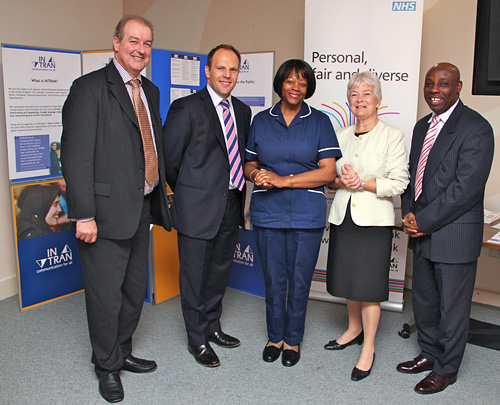“The Erinn Report – Working Towards Eradicating Racism in the Norfolk NHS Ten Years On” is released to coincide with Black History Month.
It is based upon a survey of 1387 NHS staff carried out by Dr Steven Wilkinson and Dr Kathleen Lane from the University of East Anglia in Norwich.
The report provides a snapshot of how staff have experienced both racism and also other forms of discrimination for example because of their age, gender or sexuality. It provides a comparison with a similar survey made in 2001.
The Executive Summary makes plain that since 2001 much has changed. It says: “There is still much work to be done, but it is clear that there have been indications of a positive shift in responses to discrimination and harassment. Likewise acts of racism occur less often in 2011.”
The Chair of NHS Norfolk, Sheila Childerhouse, said: “Intolerance is something that occurs across our society and as a group. NHS staff are no different to any other ‘group’ of people so I am pleased and proud that the NHS is prepared to confront the issues raised in this report.
“Eradicating racism is fundamental in ensuring that the dignity and rights of all service users and providers are protected.
“It is our intention to maintain the highest standards of care and support by providing environments that are safe and free from harassment and discrimination.”

The report makes no recommendations. NHS organisations can form their own response to the report and make direct use of it internally.
However the 2001 ERINN Report has been fundamental to the development of racial equality in Norfolk, according to the NHS ERINN group. NHS Trusts in Norfolk have put in place more robust equality and diversity policies which aim for zero tolerance of discrimination and the INTRAN translation and interpretation partnership has expanded to a region-wide organisation signed up to by 37 public bodies.
Dr Anastasia Bem, Consultant Community Paediatrician, Norfolk Community Health and Care NHS Trust (NCH&C) said: “In my experience my patients and colleagues are really interested to learn about different cultural, traditional and professional aspects of my native country – Russia – and my experience of working in Germany and Holland.
“I found that my previous experience has enriched my communication and professional role during the five years I have been working for the Trust. It has never been a barrier in my day-to-day work and often helps me to find a common ground with patients from the Baltic and other East European countries.”
Olu Ogunnowo from Norfolk and Norwich Racial Equality Council said: “The NNREC is proud of its continuing partnership with NHS Norfolk, the evidence of which is so well presented in this 10 year review of the ERINN report.
“In 2001 the publication of the research was a wake up call to all employers within the health service. We must now commit to honestly evaluating and comparing the baseline of then and now. There are good news stories in the review, but are there enough? We must renew our commitments and build on our successes.”

Snapshots from the report:
* In 2001 more than 50% of minority ethnic staff felt that there was racial discrimination in job selection procedures. In 2011 only 2% of minority ethnic staff had experienced this and more than 87% had neither experienced nor noticed discrimination in job selection.
* In 2001 85% of ethnic minority staff felt that racism was a problem within the local NHS. Approximately 60% of the White British staff shared this view. In 2011 86% of all staff believed that racism was not a problem or that it was being dealt with effectively.
* In 2001 about a third of all staff did not know if interpreters were available if required and many staff who said that interpreters were available qualified their answers. In 2011 10% of all staff did not know how to access translation services and a further 12% were unsure.
* 47% of the 2011 respondents believed that the profile of racial awareness has been raised over the past 10 years and respondents felt that there was a greater likelihood of organisational support should they be the subject of harassment or discrimination, compared with 10 years ago. However, there is still much work to be done.
The Equality Act of 2010 places a duty on public bodies to extend their protection for staff and patients/clients from discrimination on nine “characteristics” including race, sexuality, disability, marriage status and age.
The NHS is also introducing a single Equality Delivery System, to help NHS organisations work in a way which makes positive differences to healthy living and working lives.










